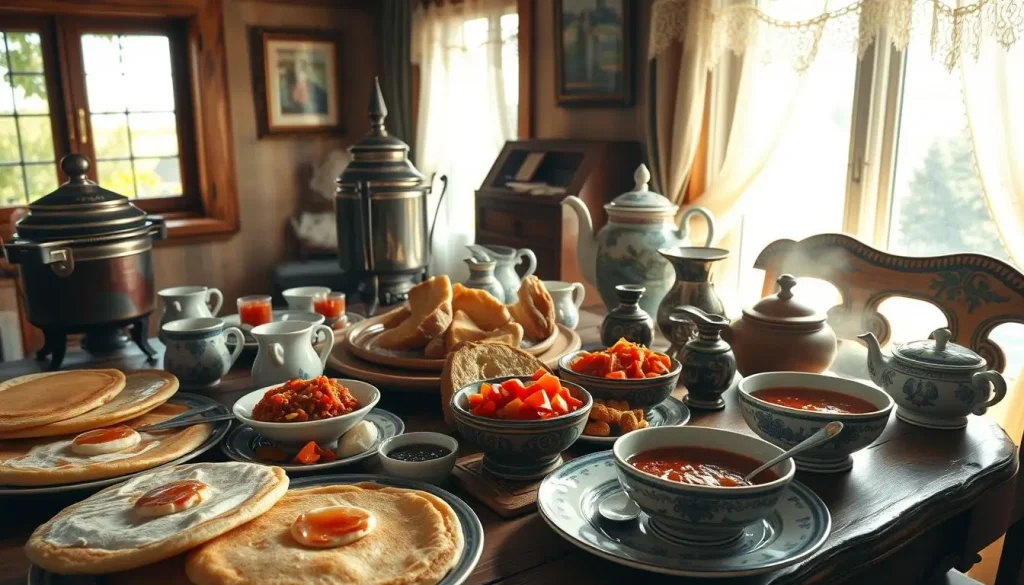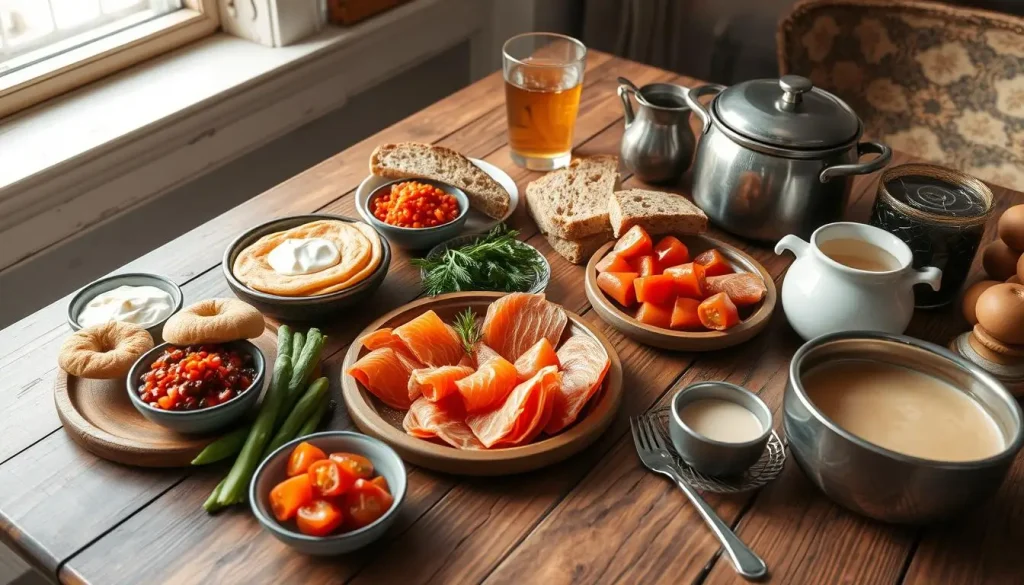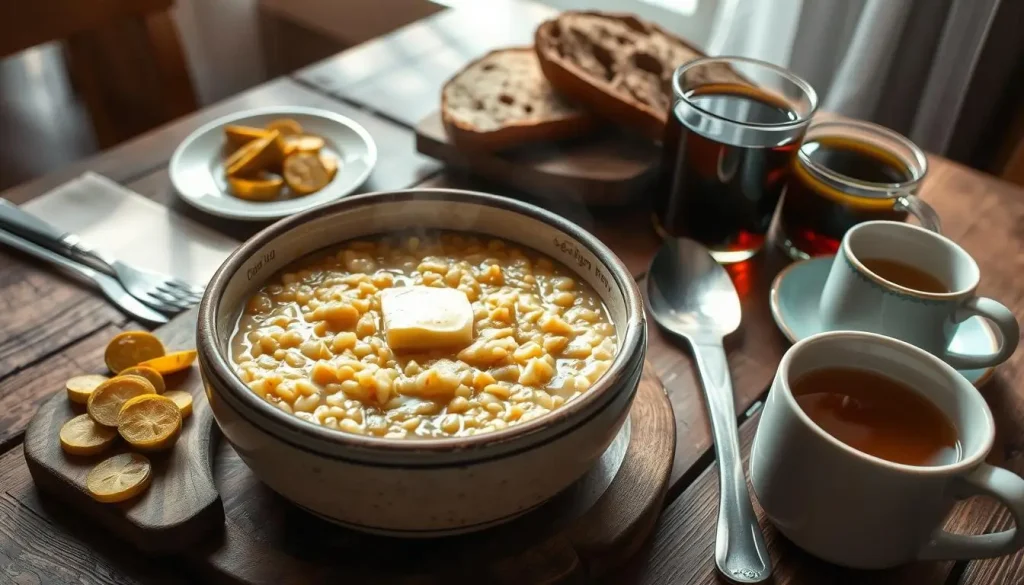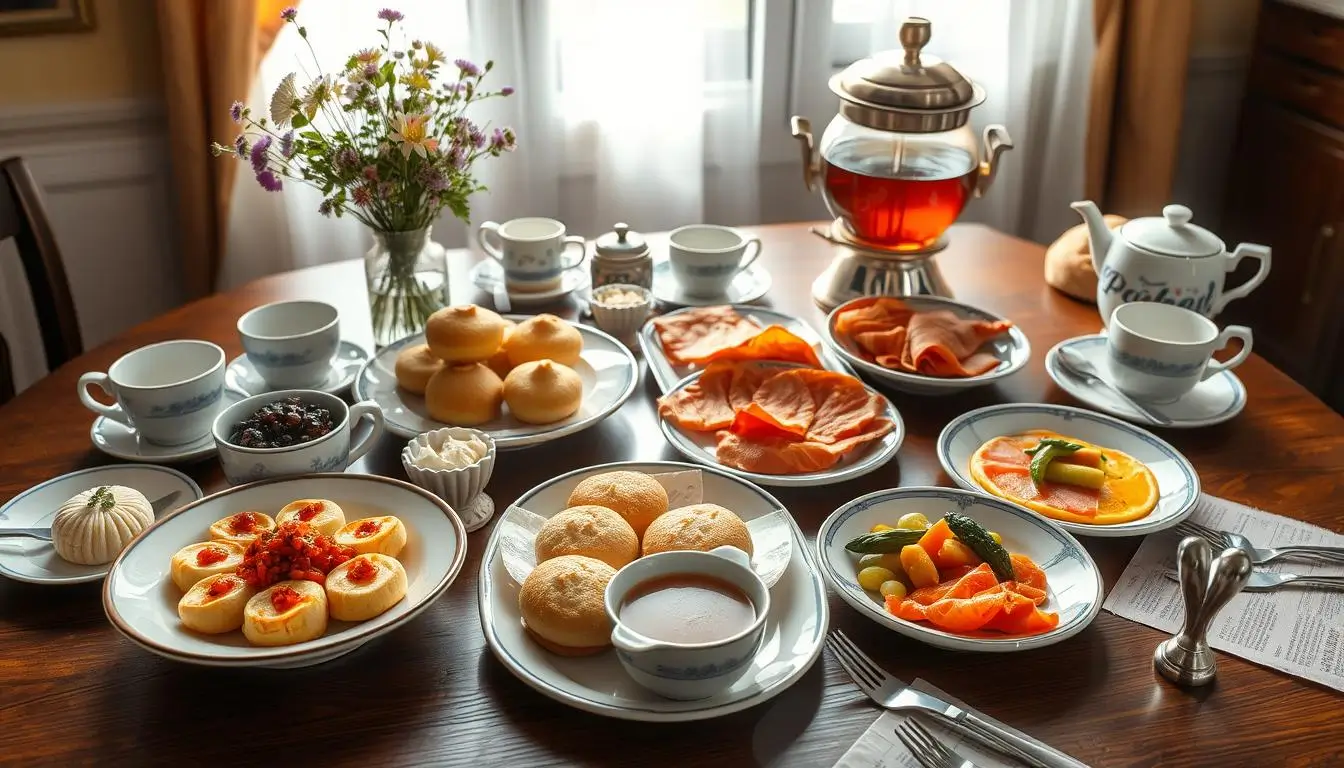Growing up in a multicultural family, I saw breakfast as more than food. My grandmother’s stories of Russian breakfast sparked my interest and made me appreciate how these meals represent the culture’s warmth and resilience. These hearty meals have kept generations warm through tough winters and hard times.
Russian breakfasts are more than just food. They are a journey through the country’s history, climate, and culture, much like the Cuban Breakfast offers a vibrant fusion of flavors and traditions. The meals, like buckwheat and rye, show a deep connection to the land.
From kasha to blini, each dish has a story. These meals are about survival, creativity, and community, similar to the nourishing options found in a Salmon Breakfast. They feed the body and nourish the soul with wisdom passed down through generations.
Key Takeaways
- Russian breakfasts blend agricultural traditions with cultural significance
- Grains like buckwheat and rye are fundamental to morning meals
- Breakfast reflects Russia’s harsh climate and historical challenges
- Traditional recipes emphasize nutritious and warming ingredients
- Morning meals serve both practical and cultural purposes
Understanding the Cultural Heritage of Russian Morning Meals
Russian breakfast culture is rich and varied. It comes from history, religion, and the environment. These meals show how Russian people are strong and adaptable. They turn simple foods into big, filling dishes that share stories of survival and identity.

Religious Influences on Breakfast Traditions
Orthodox Christianity shaped Russian food history a lot. The Christian calendar led to fasting periods. This changed breakfasts a lot.
- Lean vegetable-based dishes
- Grain-based porridges
- Plant-protein alternatives
“Breakfast is not just a meal, but a reflection of our spiritual and cultural identity” – Russian Culinary Historian
Historical Development of Morning Dining
Traditional Russian breakfasts evolved with farming. Farmers made meals that gave lots of energy for long days. They used local ingredients to make these meals.
| Historical Period | Breakfast Characteristics |
|---|---|
| Pre-Industrial Era | Grain-based, simple porridges |
| Industrial Revolution | Hearty, protein-rich meals |
| Soviet Period | Standardized, communal breakfast options |
Impact of Climate on Breakfast Choices
Russia’s cold winters changed breakfasts a lot. The cold needed high-calorie, warming foods to keep workers warm. Foods like buckwheat porridge, thick pancakes, and dense bread became key for morning energy.
- Kasha (porridge) provides essential warmth
- Blini offers quick energy
- Hot tea remains a key morning drink
Essential Ingredients in Traditional Russian Breakfast
Russian breakfast is full of hearty, nutritious foods. These foods have fed generations. They include grains, dairy, and simple yet tasty ingredients.

Buckwheat (grechka) is at the heart of Russian breakfast. It’s been a favorite for over 400 years. It gives a strong, earthy taste to many dishes.
- Grains: Buckwheat, millet, semolina, and rye flour
- Dairy Products: Tvorog (quark), sour cream, butter, and milk
- Bread Varieties: Dense rye bread, blini, and oladyi
“Breakfast in Russia is more than a meal—it’s a celebration of culinary traditions passed down through generations.”
Dairy is key in Russian breakfast. Tvorog, or cottage cheese, is in dishes like syrniki (cheese pancakes). Dairy makes simple foods into tasty morning meals.
| Ingredient Category | Key Components | Typical Use |
|---|---|---|
| Grains | Buckwheat, Millet | Porridge, Kasha |
| Dairy | Tvorog, Sour Cream | Syrniki, Toppings |
| Bread | Rye Bread, Blini | Base for Sandwiches |
Drinks are a big part of Russian breakfast. Black tea is a favorite, often with cinnamon sticks and fruit juices. Coffee, like Raf coffee from the 1990s, has also become popular.
The Art of Making Kasha: Russia’s Beloved Morning Porridge
Russian kasha is more than a porridge. It’s a warm breakfast that connects families. It’s been a Russian favorite for centuries.

Kasha is a nutritious porridge with many flavors. It’s a dish that shows Russia’s rich culture and history.
Different Types of Grains Used in Kasha
Kasha recipes use different grains for taste and texture:
- Buckwheat: The most popular and authentic grain
- Millet: Provides a creamy, smooth consistency
- Semolina: Creates a soft, comforting texture
- Oats: Offers additional nutritional benefits
Sweet and Savory Kasha Variations
Kasha can be sweet or savory. It’s up to your taste. You can make it many ways, can complement light treats like Ritz Cracker Cookies for a balanced breakfast table.
| Sweet Kasha | Savory Kasha |
|---|---|
| Honey-topped buckwheat | Butter and salt seasoned millet |
| Fruit-garnished semolina | Sour cream mixed with grains |
| Jam-sweetened porridge | Herb-infused grain mixture |
Nutritional Benefits of Morning Porridge
Kasha is not just tasty—it’s full of nutrients. Whole grains give lasting energy and important minerals. They help keep you healthy.
“Kasha is not just food, it’s a celebration of Russian culinary tradition.” – Traditional Russian Chef
Choosing kasha means you’re picking a nutritious breakfast. It’s good for your body and honors Russian culture.
Blini and Oladyi: Classic Russian Breakfast Pancakes
Russian pancakes are a big deal in traditional breakfast foods. Blini and oladyi are at the heart of Russian morning meals. They are loved all over the country for their unique qualities.
Blini are thin pancakes that show off Russian cooking skills. They can be filled with sweet or savory stuff. Maslenitsa, a special week, celebrates these pancakes and their importance.
“Blini are not just food, they are a piece of Russian soul on a plate.”
Blini and Oladyi: A Comparative Look
| Characteristic | Blini | Oladyi |
|---|---|---|
| Thickness | Thin, crepe-like | Thick and fluffy |
| Preparation Method | Yeast or buttermilk batter | Baking soda or yeast |
| Typical Serving | Rolled with fillings | Served as standalone pancakes |
Oladyi offer a different pancake experience. They are thick, soft, and very satisfying. These pancakes are great for a filling breakfast.
- Nutritional content per serving of blini:
- Calories: 167
- Protein: 5g
- Fat: 7g
- Carbohydrates: 21g
Today, chefs are making these traditional breakfast foods exciting again. They add things like spinach, beet juice, or buckwheat flour. This makes the pancakes both true to their roots and new and interesting.
Syrniki: The Traditional Cheese Pancake Delight
Russian cheese pancakes, or syrniki, are a favorite breakfast dish in Russia. They bring warmth and comfort to morning meals. These pancakes turn simple ingredients into a tasty masterpiece.
The magic of syrniki is in their simplicity and flavor. This recipe uses farmer’s cottage cheese and basic ingredients. It creates a dish loved for generations.
Step-by-Step Preparation Guide
Making perfect syrniki needs careful steps. Here’s how to do it:
- Gather high-quality ingredients: 1 lb farmer’s cottage cheese, 2 eggs, 4 tablespoons sugar
- Mix cottage cheese with eggs and sugar well
- Add ½ teaspoon baking powder and 1 cup sifted flour
- Form small pancakes about 2cm thick
- Coat lightly in additional flour
- Fry in 6 tablespoons of avocado oil or butter
Popular Toppings and Accompaniments
Syrniki are great with many toppings. People often enjoy them with:
- Fresh honey
- Fruit preserves
- Powdered sugar
- Sour cream
Regional Variations of Syrniki
Across Russia, syrniki get a special touch. Some add raisins or dried fruits. Others use vanilla for extra flavor.
*”Syrniki are more than just a meal – they’re a taste of Russian culinary heritage.”*
Pro tip: Cook each batch for 2-3 minutes on medium heat with the pan lid on. You can refrigerate them for up to 4 days or freeze for 3 months. They’re a tasty and easy breakfast.
Russian Breakfast Beverages and Their Significance
Russian morning drinks are more than just drinks. They are a big part of Russian culture. They help warm the body and spirit, which is important in the cold Russian winters.
Tea is the top choice for Russian morning drinks. It’s strong black tea, often with lemon or jam. Drinking tea is not just about staying hydrated. It’s a way to connect with others.
- Black tea with lemon
- Kefir – a probiotic-rich fermented milk drink
- Coffee (growing in urban popularity)
- Herbal infusions
Kefir is another favorite drink. It’s a fermented milk drink full of good bacteria and protein. Russians like to drink it alone or with bread.
“In Russia, a morning without tea is like a morning without sunshine.” – Traditional Russian saying
| Beverage | Popularity | Typical Serving |
|---|---|---|
| Black Tea | Most Popular | Hot, with lemon or jam |
| Kefir | High | Chilled, plain or with bread |
| Coffee | Growing | Espresso or mixed drinks |
Coffee has become more popular over the years. Raf coffee, a mix of espresso, vanilla sugar, and cream, was a hit in the 1990s. It shows how Russian breakfast tastes are changing.
Even though coffee is getting more attention, tea is the core of Russian morning drinks. It connects people across generations with a simple, warm tradition.
Seasonal Influences on Russian Morning Meals
Russian cuisine celebrates nature’s rhythm through its seasonal breakfasts. Each season brings new flavors and ingredients. These change morning meals into a journey through the country’s climate and farming history.
The changing seasons greatly affect Russian breakfast choices. Each morning meal shows the environment and available ingredients.
Winter Breakfast Specialties
In the cold winter, Russian breakfasts are hearty and warm. They focus on foods rich in nutrients and calories. These foods give the energy needed to fight off the cold.
- Thick porridges made from various grains
- Preserved vegetables and jams
- Hearty meat-based dishes
- Warm, comforting beverages like tea and sbiten
Summer Morning Delicacies
In summer, Russian breakfasts are light and refreshing. They use fresh produce and berries.
- Fresh berry-topped kasha
- Cold milk-based soups
- Vegetable-filled blini
- Chilled fruit compotes
Harvest Season Breakfast Traditions
The harvest season brings fresh ingredients for new breakfast ideas. Russian families celebrate with big morning meals. These meals feature locally grown produce.
“In Russia, breakfast is more than a meal – it’s a celebration of the land’s generosity.” – Traditional Russian Culinary Saying
Each season’s change tells a story through food. It connects generations and keeps cultural traditions alive.
Modern Adaptations of Traditional Russian Breakfast
The world of Russian breakfast has changed a lot in recent years. Cities in Russia are seeing a big change in food. Young people are mixing old breakfast ideas with new ones.
Now, healthy Russian meals are more popular. Chefs and home cooks are making old recipes healthier. They use plant-based foods and lighter cooking methods.
- Smoothie-inspired kasha variations
- Low-carb syrniki with almond flour
- Avocado-topped blini
- Quinoa-based traditional porridge
“Breakfast is no longer just a meal, but a canvas for culinary creativity,” says Moscow food critic Elena Petrova.
Today’s breakfast trends mix health with tradition. Modern Russians make meals that are both new and true to their roots.
| Traditional Element | Modern Adaptation | Nutritional Impact |
|---|---|---|
| Kasha | Protein-enriched grain mix | Higher protein content |
| Syrniki | Gluten-free cheese pancakes | Reduced carbohydrates |
| Blini | Superfood-topped variations | Enhanced nutrient profile |
These new ideas show how Russian breakfast is growing. It welcomes new tastes while keeping its deep food culture.
The Role of Dairy Products in Russian Breakfast
Russian dairy traditions are key to making breakfasts both healthy and tasty. Exploring traditional breakfasts shows how important tvorog and sour cream are in Russian food.
Tvorog is a standout ingredient in breakfast. It turns simple dishes into amazing meals. This cheese is full of protein, making it a great start to the day.
“In Russia, dairy is not just food – it’s a cultural heritage passed through generations” – Russian Culinary Historian
Sour cream is more than just a topping. It’s used in many ways in Russian kitchens. It adds flavor and richness to breakfast dishes.
- Tvorog: Primary protein source in morning meals
- Sour cream: Versatile topping for pancakes and porridges
- Kefir: Traditional fermented milk beverage
| Dairy Product | Breakfast Usage | Nutritional Benefit |
|---|---|---|
| Tvorog | Syrniki, Vatrushka | High Protein, Calcium |
| Sour Cream | Pancake Topping, Porridge Enhancer | Probiotics, Vitamin A |
| Kefir | Breakfast Drink | Digestive Health Support |
A study in the European Journal of Clinical Nutrition shows these dairy products are good for you. They help with digestion and overall health.
Regional Breakfast Specialties Across Russia
Russia’s vast landscape shows a rich mix of regional cuisines. Local breakfasts reflect the area’s culture and geography. From Siberia’s cold to the coast’s sea breeze, each place adds its own twist to morning meals.
Diverse foods tell the story of Russia’s breakfast traditions. These traditions change a lot across the country. Let’s explore Russia’s regional breakfasts together.
Siberian Morning Delicacies
In Siberia, breakfast is big and warm to fight the cold. You’ll find:
- Rich porridges from local grains
- Pelmeni, a protein-rich dish
- Wild berry compotes with local fruits
Coastal Region Breakfast Customs
Coastal areas are known for seafood in their breakfasts. You might enjoy:
- Smoked salmon and herring
- Fresh caviar spreads
- Seafood open sandwiches
Central Russian Breakfast Traditions
Central Russia loves baked goods and dairy. You’ll find:
- Pirozhki with savory fillings
- Vatrushka pastries with sweet cheese
- Syrniki (cheese pancakes) with sour cream
“In Russia, breakfast is more than a meal – it’s a celebration of regional identity and culinary heritage.”
Every region’s breakfast is shaped by its environment, ingredients, and culture. This makes Russian morning food a fascinating journey of taste and tradition.
How to Create an Authentic Russian Breakfast at Home
Making a homemade Russian breakfast brings warmth to your kitchen. I’ll share tips for a real Russian morning meal.
- Choose the right ingredients for classic dishes
- Master the art of preparing traditional recipes
- Understand the cultural significance of each dish
Essential Ingredients and Techniques
For a real authentic morning meal, focus on these key parts:
- Kasha (Grain Porridge)
- Use buckwheat or semolina grains
- Cook with milk or water
- Add butter or honey for extra flavor
- Syrniki (Cheese Pancakes)
- Prepare with farmer’s cheese
- Mix 450g cheese with 2 large eggs
- Add 4 tablespoons of sugar
- Fry until golden brown
“A Russian breakfast is more than just food; it’s a celebration of culinary tradition.” – Russian Culinary Expert
Nutritional Breakdown of Syrniki
| Nutrient | Amount per Serving |
|---|---|
| Calories | 367 kcal |
| Protein | 20g |
| Carbohydrates | 28g |
| Fat | 19g |
Pro tip for your homemade Russian breakfast: Serve syrniki with powdered sugar, jam, or sour cream. Enjoy with strong black tea or kefir for a full experience.
Creating a traditional Russian breakfast is about simple, rich flavors. Start with these recipes and bring Russia to your morning table!
Conclusion
Exploring Russian breakfast culture shows a world of flavors and traditions. It’s more than just food in the morning. It connects us to heritage, family, and the vast lands of Russia.
From syrniki to kasha, each dish shares a story of strength and pride. These meals are a big part of Russian life.
Russian breakfasts are all about respecting food and cooking methods. It’s not just about eating. It’s about making memories and sharing moments with others.
Every region in Russia adds its own special touch to breakfast. Whether it’s the bold dishes of Siberia or the fine meals in cities.
As food from around the world mixes together, Russian breakfasts show the importance of keeping traditions alive. They remind us that breakfast is a time to celebrate history, family, and the joy of eating.
Learning about a culture starts at the breakfast table. It’s where stories are told, traditions kept, and bonds are made. Russian breakfasts keep evolving but stay true to their delicious heritage.
FAQ
What are the most traditional Russian breakfast foods?
Traditional Russian breakfast foods include kasha (porridge), blini (thin pancakes), and oladyi (thick pancakes). Syrniki (cheese pancakes) and dairy products like tvorog (quark) and smetana (sour cream) are also popular. These dishes show the rich culinary heritage of Russian morning meals.
Is Russian breakfast typically sweet or savory?
Russian breakfasts offer both sweet and savory options. Kasha can be sweet with honey or jam, or savory with butter and salt. Blini and syrniki can have sweet toppings like jam or powdered sugar, or savory fillings like smoked fish or sour cream.
What is the most important beverage in a traditional Russian breakfast?
Strong black tea has long been key in Russian breakfasts. But, kefir (a probiotic fermented milk drink) is also very popular. Coffee is becoming more popular, mainly in cities.
How do Russian breakfasts change with the seasons?
Seasonal changes affect Russian breakfasts. Summer brings fresh berries and fruits. Winter focuses on preserved foods like jams and pickled vegetables. The harvest season adds fresh produce to breakfasts.
What makes kasha such a special dish in Russian cuisine?
Kasha is more than a breakfast dish. It symbolizes warmth, sustenance, and nostalgia. Made from grains like buckwheat, millet, or semolina, it’s versatile and served both sweet and savory. It connects generations and shows Russia’s agricultural traditions.
Are there regional differences in Russian breakfast traditions?
Yes! Regional variations are big. Coastal areas include seafood like smoked salmon and caviar. Siberia is known for hearty porridges and pelmeni. Central Russia is famous for baked goods like pirozhki and vatrushka. Each region adds its own twist to breakfasts.
How have modern trends influenced traditional Russian breakfasts?
New trends have arrived with globalization. While traditional dishes are loved, younger people enjoy international options like smoothies and avocado toast. Health trends have also led to plant-based and low-carb versions of traditional foods, creating new breakfast ideas.
What role do dairy products play in Russian breakfasts?
Dairy products are key in Russian breakfasts. Tvorog (quark) is used in syrniki, smetana (sour cream) is a topping, and kefir is a favorite drink. They add flavor, richness, and important nutrients to morning meals.
Can I make authentic Russian breakfast dishes at home?
Yes, you can! Making kasha, blini, and syrniki is easy. Use traditional ingredients like buckwheat, tvorog, and fresh eggs. Serve with strong black tea or kefir for a real Russian breakfast at home.

